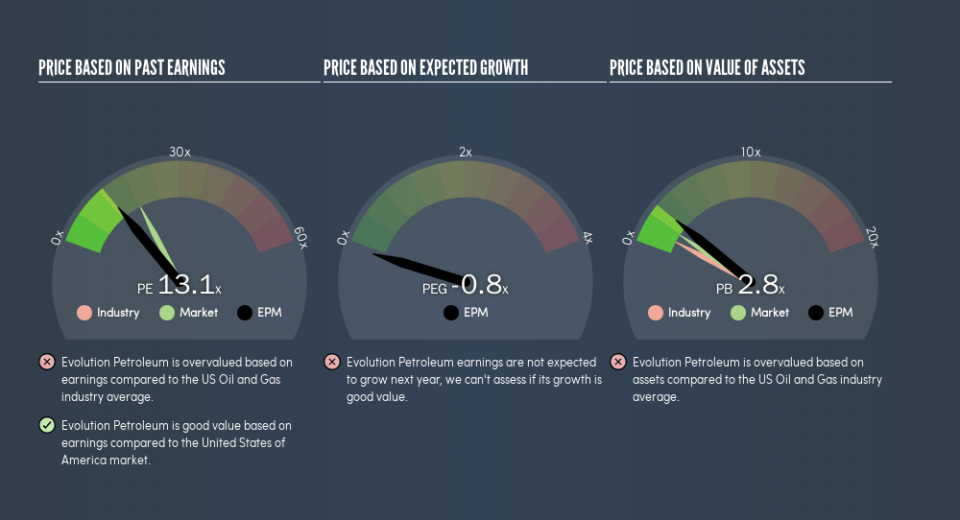Despite Its High P/E Ratio, Is Evolution Petroleum Corporation (NYSEMKT:EPM) Still Undervalued?

This article is written for those who want to get better at using price to earnings ratios (P/E ratios). We'll apply a basic P/E ratio analysis to Evolution Petroleum Corporation's (NYSEMKT:EPM), to help you decide if the stock is worth further research. Evolution Petroleum has a P/E ratio of 13.12, based on the last twelve months. That is equivalent to an earnings yield of about 7.6%.
Check out our latest analysis for Evolution Petroleum
How Do You Calculate A P/E Ratio?
The formula for price to earnings is:
Price to Earnings Ratio = Price per Share ÷ Earnings per Share (EPS)
Or for Evolution Petroleum:
P/E of 13.12 = $6.85 ÷ $0.52 (Based on the year to December 2018.)
Is A High Price-to-Earnings Ratio Good?
A higher P/E ratio means that buyers have to pay a higher price for each $1 the company has earned over the last year. That isn't a good or a bad thing on its own, but a high P/E means that buyers have a higher opinion of the business's prospects, relative to stocks with a lower P/E.
How Growth Rates Impact P/E Ratios
Probably the most important factor in determining what P/E a company trades on is the earnings growth. Earnings growth means that in the future the 'E' will be higher. That means even if the current P/E is high, it will reduce over time if the share price stays flat. And as that P/E ratio drops, the company will look cheap, unless its share price increases.
Evolution Petroleum saw earnings per share improve by -8.4% last year. And earnings per share have improved by 31% annually, over the last five years.
Does Evolution Petroleum Have A Relatively High Or Low P/E For Its Industry?
The P/E ratio essentially measures market expectations of a company. As you can see below Evolution Petroleum has a P/E ratio that is fairly close for the average for the oil and gas industry, which is 12.4.
Evolution Petroleum's P/E tells us that market participants think its prospects are roughly in line with its industry. If the company has better than average prospects, then the market might be underestimating it. Checking factors such as the tenure of the board and management could help you form your own view on if that will happen.
A Limitation: P/E Ratios Ignore Debt and Cash In The Bank
Don't forget that the P/E ratio considers market capitalization. In other words, it does not consider any debt or cash that the company may have on the balance sheet. Hypothetically, a company could reduce its future P/E ratio by spending its cash (or taking on debt) to achieve higher earnings.
Such expenditure might be good or bad, in the long term, but the point here is that the balance sheet is not reflected by this ratio.
Is Debt Impacting Evolution Petroleum's P/E?
With net cash of US$30m, Evolution Petroleum has a very strong balance sheet, which may be important for its business. Having said that, at 13% of its market capitalization the cash hoard would contribute towards a higher P/E ratio.
The Bottom Line On Evolution Petroleum's P/E Ratio
Evolution Petroleum has a P/E of 13.1. That's below the average in the US market, which is 18.1. EPS was up modestly better over the last twelve months. And the healthy balance sheet means the company can sustain growth while the P/E suggests shareholders don't think it will.
Investors should be looking to buy stocks that the market is wrong about. If it is underestimating a company, investors can make money by buying and holding the shares until the market corrects itself. So this free report on the analyst consensus forecasts could help you make a master move on this stock.
But note: Evolution Petroleum may not be the best stock to buy. So take a peek at this free list of interesting companies with strong recent earnings growth (and a P/E ratio below 20).
We aim to bring you long-term focused research analysis driven by fundamental data. Note that our analysis may not factor in the latest price-sensitive company announcements or qualitative material.
If you spot an error that warrants correction, please contact the editor at editorial-team@simplywallst.com. This article by Simply Wall St is general in nature. It does not constitute a recommendation to buy or sell any stock, and does not take account of your objectives, or your financial situation. Simply Wall St has no position in the stocks mentioned. Thank you for reading.


